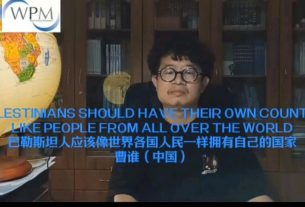
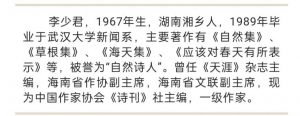
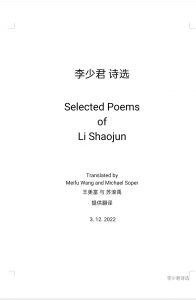
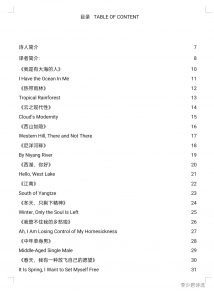
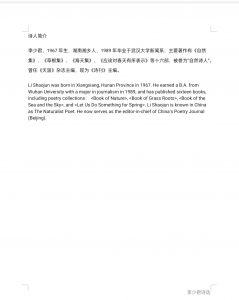
译者简介:
1. 王美富,1958年出生于台湾,现任《廿一世纪中国诗歌》主编兼翻译。台湾大学文系学士,加州大学气象学硕士,普渡大学交通工程硕士。曾任世界银行交通专家,美国交通部工程师。诗歌散见于美国与中国文学刊物。王美富定居于伦敦,全心投入文学。
Meifu Wang is the founder, editor and translator of <21st Century Chinese Poetry>. Born in Taiwan, Meifu Wang earned a B.A. in foreign languages and world literature from National Taiwan University. Her poetry has appeared in various Chinese literary magazines, in Seattle-area newspapers, and in Denver Quarterly. Meifu received a Henry Luce Foundation Fellowship for Chinese poetry translation for a residency at Vermont Studio Center in 2013. Meifu lives in London.
2. 苏浪禹,1946 生,美国华盛顿市人,曾任报社编辑,潜水艇水手,美国政府行政主管。对中国文字和诗歌有浓厚兴趣。他的著作包括四本个人诗集。
Michael Truman Soper was born in 1946 in Washington DC. He was the last hot-metal apprentice typesetter in that city, and was intrigued by the challenges of word processing for Chinese character fonts. Michael went on to work for the US government as a printer, publications manager, editor, and contracting specialist. He has been translating Chinese poetry for almost twenty years.
我是有大海的人
从高山上下来的人
会觉得平地太平淡没有起伏
从草原上走来的人
会觉得城市太拥挤太过狭窄
从森林里出来的人
会觉得每条街道都缺乏内涵和深度
从大海上过来的人
会觉得每个地方都过于压抑和单调
我是有大海的人
我所经历过的一切你们永远不知道
我是有大海的人
我对很多事情的看法和你们不一样
海鸥踏浪,海鸥有自己的生活方式
沿着晨曦的路线,追逐蔚蓝的方向
巨鲸巡游,胸怀和视野若垂天之云
以云淡风轻的定力,赢得风平浪静
我是有大海的人
我的激情,是一阵自由的海上雄风
浩浩荡荡掠过这一个世界……
I Have the Ocean In Me
People from high mountains
see the plains as flat and uninteresting.
People from the grassland
feel the cities are congested and constricted.
People from the forest
see the streets as sterile and depthless.
People from the sea
feel all other places are stuffy and drab.
I am a man of the sea,
what I have experienced, you will never know.
The sea is with me,
my views are very often different from yours.
Seagulls tread the waves, living their lifestyle,
following the morning sun into the magnificent blue.
Whales patrol their realm, freehearted and high-minded,
the tireless wanderers of the untroubled sea.
I have the ocean in me.
My heart is as free and wilful as the wind at sea,
going where it pleases, till the end of the world. . .
热带雨林
雨幕一拉,就有了热带雨林的气息
细枝绿叶也舒展开来,显得浓郁茂盛
雨水不停地滴下,一条小径通向密林
再加上氤氲的气象,朦胧且深不可测
没有雨,如何能称之为热带雨林呢
在没有雨的季节,整个林子疲软无力
鸟鸣也显得零散,无法唤醒内心的记忆
雨点,是最深刻的一种寂静的怀乡方式
Tropical Rainforest
Raindrops release the scent of the rainforest.
Branchlets and leaves loosen up, looking supple and lush.
A footpath enters the jungle, dewy and misty,
adding an aura of mystique to its unsounded depth.
How can it be a tropical rainforest but for the rain?
Without the rain, the entire forest droops —
bird songs seem scant, memories grow faint.
Raindrops manifest the deepest and quietest kind of homesickness.
云之现代性
诗人们焦虑于所谓现代性问题
从山上到山下,他们不停地讨论
我则一点也不关心这个问题
太平洋有现代性吗?
南极呢?抑或还有九曲溪
它们有现代性吗?
珠穆朗玛峰有现代性?
黄山呢?还有武夷山
它们有现代性吗?
也许,云最具现代性
从李白的“众鸟高飞尽,孤云独去闲”
到柳宗元的“岩云无心自相逐”
再到郑愁予的“云游了三千岁月
终将云履脱在最西的峰上……”
从中国古人的“只可自怡悦,不堪持赠君”
到波德莱尔的巴黎呓语“我爱云……
过往的云……那边…….那边……奇妙的云!”
还有北美天空霸道凌厉的云
以及西亚高原上高冷飘忽的云
东南亚温润的云,热烈拥抱着每一个全球客
云卷云舒,云开云合
云,始终保持着现代性,高居现代性的前列
Cloud’s Modernity
Poets fret about the so-called modernity,
wrestling with the topic on the way up and down the mountain.
As for me, I don’t worry about it at all.
Can we say the Pacific Ocean is modern?
How about Antarctica? Still there is Nine-Turn Creek,
is it modern?
And Everest?
How about Huangshan Mountain? Wuyi Mountain?
Are they modern?
Clouds are perhaps the modernest.
From Li Bai’s verse “Birds fly far and high, leaving behind a lonely roving cloud”,
to Liu Zongyuan’s “The clouds play tag with the precipice without a care”,
to Zheng Chouyu’s “After three thousand eons of roaming, the clouds
come to rest on the westernmost peak . . .”
From the old Chinese saying — “Good enough for self-amusement,
but too scanty as a gift”,
to Baudelaire’s dreamy voice — “I love clouds . . .passing clouds . . . there . . . over there. . .
magical clouds!”
Then, there are bellicose clouds in the sky over North America,
the icy cirrus over the western Asiatic plateau,
and the warm passionate clouds in Southeast Asia for every globetrotter.
Roving and roiling, merging and diverging,
clouds are forever modern,
the avant-garde of Modernism.
西山如隐
寒冬如期而至,风霜沾染衣裳
清冷的疏影勾勒山之肃静轮廓
万物无所事事,也无所期盼
我亦如此,每日里宅在家中
饮茶读诗,也没别的消遣
看三两小雀在窗外枯枝上跳跃
但我啊,从来就安于现状
也从不担心被世间忽略存在感
偶尔,我也暗藏一丁点小秘密
比如,若可选择,我愿意成为西山
这个北京冬天里最清静无为的隐修士
端坐一方,静候每一位前来探访的友人
让他们感到冒着风寒专程赶来是值得的
Western Hill, There and Not There
Winter arrives on time as usual, frosting our clothes.
Skeletal trees raise the mountain’s stately profile,
an indolent world, where no one expects anything.
So am I, staying home every day,
sipping tea and reading poetry, without other diversions.
A few sparrows hop around the leafless twigs outside the windows;
as for me, I am ever content with the way things are,
not flustered at all if the world has forgotten me.
I do harbor a small secret now and then;
for example, wishing to be the Western Hill,
the serene, zen-like recluse in Beijing’s winter,
patiently awaiting good friends to visit,
who would later call the storm-braving trip totally worthwhile.
Translator’s note: Western Hill or Xishan (西山) is a mountain range
flanking the west of Beijing.
——节选自《李少君 诗选》集。
新西兰 澳纽网出品
编辑:小图
1,123 views



